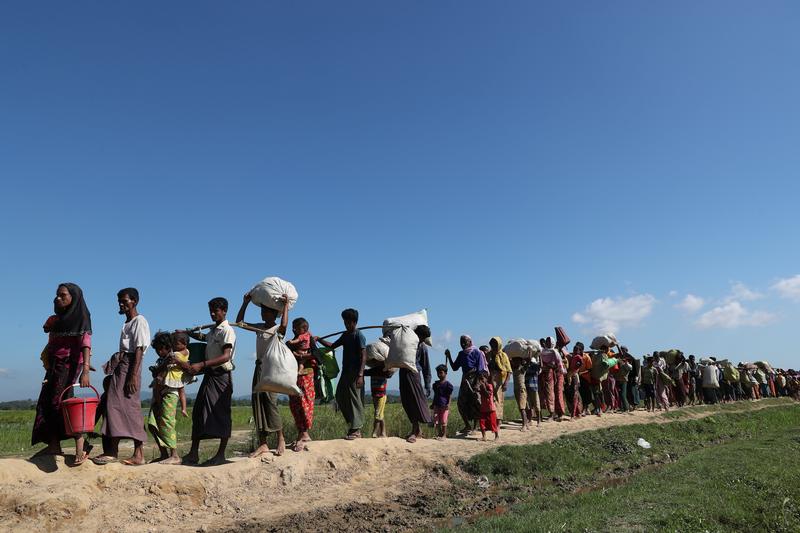WASHINGTON — The United States on Wednesday called the Burmese military operation against the Rohingya population “ethnic cleansing” and threatened targeted sanctions against those responsible for what it described as “horrendous atrocities.”
“The situation in northern Rakhine State constitutes ethnic cleansing against the Rohingya,” US Secretary of State Rex Tillerson said in a statement, using a term he avoided when visiting Burma last week.
“The United States will also pursue accountability through US law, including possible targeted sanctions” against those responsible for the alleged abuses, which have driven hundreds of thousands of Rohingya into neighboring Bangladesh, he said.
The United States shifted its stance in part to raise pressure on Burma’s military and civilian leaders, who have shared power for the past two years under an uneasy arrangement after decades of military rule, to address the crisis.
Rights monitors have accused Burma’s military of atrocities, including killings, mass rape and arson, against the stateless Rohingya during so-called “clearance operations” after Rohingya militants’ attacks on 25 August against 30 police posts and an army base.
More than 600,000 Rohingya Muslims have fled Rakhine State in Buddhist-majority Burma, mostly to neighbouring Bangladesh, since the crackdown that followed the insurgent attacks.
“These abuses by some among the Burmese military, security forces, and local vigilantes have caused tremendous suffering and forced hundreds of thousands of men, women and children to flee their homes,” Tillerson said.
While repeating US condemnation of the insurgent attacks, he added: “No provocation can justify the horrendous atrocities that have ensued.”
Burma’s two-year-old civilian government, led by Nobel Peace Prize laureate Aung San Suu Kyi, has faced heavy international criticism for its response to the crisis, though it has no control over the generals with whom it shares power.
“It’s not a situation that is completely under her authority, but certainly we are counting on her to show leadership and also to work through the civilian government with the military to address the crisis,” a senior US official told reporters in a conference call.
The term “ethnic cleansing” is not defined in international or US law and does not inherently carry specific consequences, a second senior US official said on the call.
The US move came the same day that a UN tribunal convicted former Bosnian Serb military commander Ratko Mladic of genocide and crimes against humanity for massacres of Bosnian Muslims and ethnic cleansing campaigns, and imprisoned him for life.
The second US official said Washington was analysing whether genocide or crimes against humanity had occurred in Burma, which would violate international law, but has made no determination on either and that this would take time to assess.
“In the end it’s a court that has to decide that, as we’ve just seen with the verdict against Mladic,” he said.
A top UN official in September described the Burmese military’s actions as a textbook case of “ethnic cleansing,” but the United States until Wednesday had avoided the term.
Washington has sought to balance its wish to nurture the civilian government in Burma, where it competes for influence with China, with its desire to hold the military accountable for the abuses. US officials also worry that the mistreatment of the Rohingya Muslim minority may fuel radicalism.
The first US official said Washington would work with Bangladesh and Burma to encourage the voluntary repatriation of Rohingya.
“We have focused on the issue of voluntary returns,” the official said. “We don’t want people to be forced to return to a situation in which they feel uncomfortable.”
Congressional pressure for a tougher US response to the Rohingya crisis mounted before President Donald Trump’s first visit to Asia this month to attend a summit of Southeast Asian countries, including Burma, in Manila.
[related]
US government sources told Reuters in October that officials were preparing a recommendation for Tillerson that would define the military-led campaign against the Rohingya as ethnic cleansing, which could spur new sanctions.
In early November, US lawmakers proposed targeted sanctions and travel restrictions on Burmese military officials.
The US-based advocacy organisation Refugees International hailed Tillerson’s assessment of ethnic cleansing, but said it was essential that sanctions be imposed on key military leaders, including the army chief, Senior-General Min Aung Hlaing.
Rights group Amnesty International has called for a comprehensive arms embargo against Burma as well as targeted financial sanctions against senior Burmese military officials.



